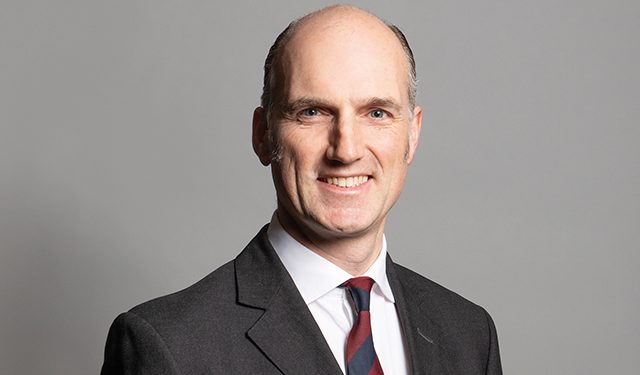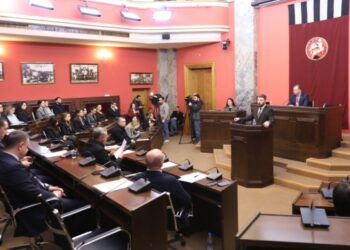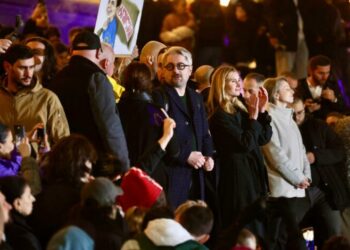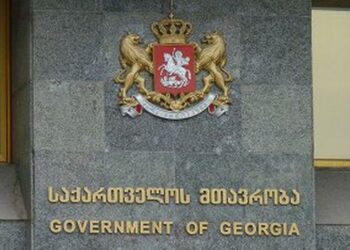Known as the ‘Wardrop Dialogue’, UK Foreign Secretary James Cleverly hosted Georgia’s Foreign Minister Ilia Darchiashvili at Lancaster House in London on 26 January for the 8th annual UK-Georgia Strategic Dialogue. Minister Darchiashvili was told that the UK would “stand by Georgia for the long term.”
During the meeting, the ministers agreed to increase cooperation on a range of priorities, including combatting Putin’s aggression through continued collaboration on international sanctions, and supporting Georgia’s aspirations for closer ties with NATO through the Tailored Support Package.
Radio Free Europe’s Georgian Service spoke to UK Minister for Europe Leo Docherty after the meeting.
Let’s start with the importance and impact of the Wardrop Dialogue. What has been achieved?
Let me begin by saying that because of the remarkable change of security contexts in the region, this meeting was particularly important. Georgia knows more than any other country about what it’s like to suffer a Russian invasion. From our perspective, Georgia has a really important role in regional stability in the Caucasus, and we want to help them on their journey to develop as a nation. We really appreciate their Euro-Atlantic journey, and so it was a useful day to discuss all of that and to map out our deeper cooperation in the future. Cooperation in defense and security is very important, as in energy, because Georgia is a really important country through which a great deal of energy supply transmits.
Concerning the changing security environment – As a former military and now Minister of Europe, do you think there is more Europe could do for Ukraine when it comes to military assistance?
This has been a big week actually. We’ve seen a remarkable step up in provision. And I think what we’ll be interested to see is exactly how quickly that translates into fighting power on the side of the Ukrainians.
But I think that’s a very strong message as to the European and US collective resolve. There may be other things, but I think they’ll be considered when the Ukrainians request them – we will always consider any requests from our Ukrainian friends. There are also logistic constraints as to what is best suited to the Ukrainian requirements. We have to wait now and see how they how they get on with this very significant increase in military support this year.
Perhaps re-arming and strengthening other countries in the region who are potentially under threat from Moscow should also be the order of the day?
You’re absolutely right. There’s a massive regional impact, and we are doing everything we can with countries neighboring Ukraine to build their resilience. The entire security architecture of eastern central Europe has changed fundamentally. And this will be a change that lasts for a very long time.
What about Georgia – anything in particular in store?
Talking in broad terms, it’s very true to say that the necessity of having strong Georgian institutions, including a strong and strengthening military, is very important. And I think the trend of empowering nations in Eastern Europe and in the Black Sea and the Caucasus; having strong militaries, but also open economies, free societies and vibrant press; being members of the free market world, is crucial. What was really instructive about the last year was the failure of the autocratic model. Many commentators predicted prior to February 24 that Putin’s military would steamroll across Ukraine; would occupy and defeat the Ukrainian nation in very short order. Exactly the reverse happened. And that really demonstrates the failure of autocracy in the sense that anyone who thought that Putin’s military was effective, because he was an autocrat and wasn’t being held to account by a parliament, has been proved wrong.
In Georgia, in the absence of a NATO umbrella, there is always a question hanging over the country’s future. After the war in Ukraine, Kyiv may be welcomed into NATO. Would any consideration be given to Georgia’s similar aspirations? After all, it’s been knocking on NATO’s open door for decades now.
In the long term, anything’s possible. In the last year, we’ve seen the failure of Putin’s calculation. He thought by claiming that NATO was being aggressive and provocative, he would end up with less of a NATO presence on his doorstep. Well, it’s quite the reverse, and he’s probably going to end up with more NATO. What he’s done is to unify and strengthen the resolve of NATO in a way that, frankly, was unthinkable, because he’s forced all NATO members through this crisis to actually face up to the need for hard power, and a much greater investment in military capability, in a way that was completely impossible before the war. So it’s a massive irony, a huge paradox: He’s brought about by his own actions and his own personal decisions, the very circumstance he claims to be acting against.
Has Putin’s invasion of Ukraine made Georgia’s NATO membership prospects more or less likely?
In the very long term, probably more likely. Because if you look at countries like Armenia, or Serbia, any country that thought that having a very deep security defense relationship with Russia was a good thing, has been proved wrong. And all of these countries that were formerly very deep Russian allies, Putin’s allies, are now looking around for alternatives. So let’s see what happens.
Interview by Vazha Tavberidze














